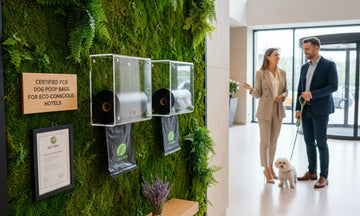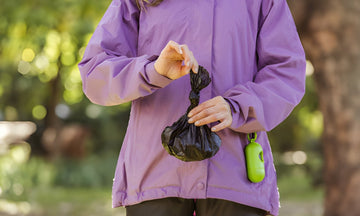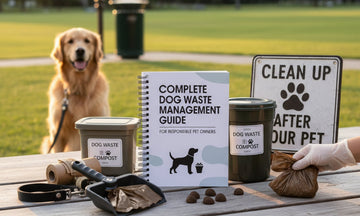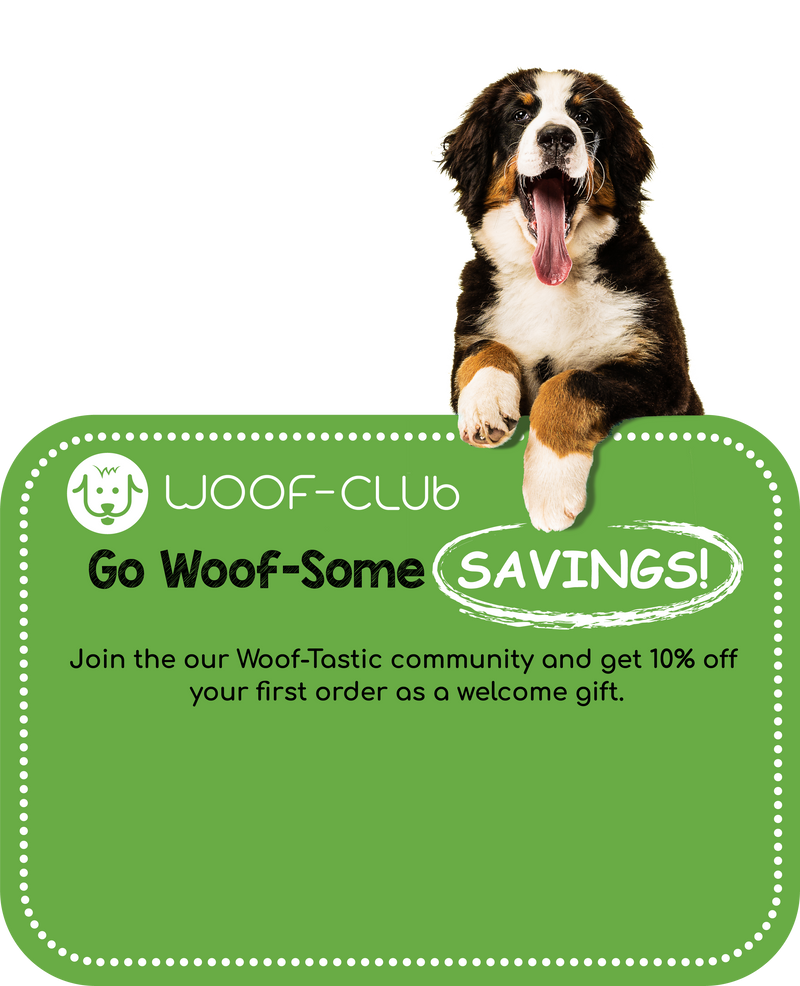Dog poop bags are used in incredible numbers internationally, with approximately 180 million of them being used every month in Australia alone—enough to wrap around the Earth one and a half times! While most dog owners understand the importance of cleaning up after their furry companions, the environmental impact of their choices is becoming increasingly concerning.
Traditional plastic poop bags can take hundreds of years to decompose in landfills, breaking down gradually into harmful microplastics. However, the available alternatives can be just as confusing.
Many producers claiming to provide "biodegradable" or "plant-based" answers might be deceptive. In reality, a 2019 clinical study found that numerous bags labelled "biodegradable" survived for at least three years, whether left outside, buried in soil, or submerged in seawater. This finding raises serious questions about what we are truly shopping for when we pick environmentally friendly dog poop bags.
In this newsletter, we will clarify the confusion surrounding special types of puppy poop bags, provide an explanation for what phrases like "biodegradable" and "compostable" actually mean, and help you make an informed choice that's better for our planet.
Clearing the Confusion: Biodegradable vs Compostable vs Degradable
Dog poop bags often use the phrases "biodegradable," "compostable," and "degradable" interchangeably, leading to massive confusion for eco-aware pet owners. However, understanding these differences is essential for making environmentally conscious decisions.
The first point to understand is that degradable dog poop bags are simply regular plastic bags with misleading labels.
Let’s Find Our Best Poop Bags Here
Biodegradable Bags: Better But Still Problematic
 Biodegradable canine poop bags sound promising but often fail to meet expectations. They comprise additives that enhance the breakdown process compared to everyday plastic luggage. Unfortunately, compostable bags still decompose into the same complex microplastics. Many scientists accept that they provide no sizeable environmental benefit over conventional plastic luggage. Additionally, the Federal Trade Commission has warned 20 producers about probably deceptive "biodegradable" claims.
Biodegradable canine poop bags sound promising but often fail to meet expectations. They comprise additives that enhance the breakdown process compared to everyday plastic luggage. Unfortunately, compostable bags still decompose into the same complex microplastics. Many scientists accept that they provide no sizeable environmental benefit over conventional plastic luggage. Additionally, the Federal Trade Commission has warned 20 producers about probably deceptive "biodegradable" claims.
Compostable Bags: Closer to Green—But Not Perfect
 Compostable luggage constitutes what most humans suppose biodegradable bags are. Made mainly from plant-based substances like cornflour, these bags can break down in under six months in the appropriate surroundings. Yet there is a catch—maximum compostable bags include the handiest 20% plant-based fabric, with 50–80% made from PBAT, a fossil-fuel-based biodegradable plastic.
Compostable luggage constitutes what most humans suppose biodegradable bags are. Made mainly from plant-based substances like cornflour, these bags can break down in under six months in the appropriate surroundings. Yet there is a catch—maximum compostable bags include the handiest 20% plant-based fabric, with 50–80% made from PBAT, a fossil-fuel-based biodegradable plastic.
Degradable Bags: Misleading Labels and Microplastic Pollution
Despite what the call suggests, all plastic is technically degradable; the question is how long it takes to degrade. This baggage can take thousands of years to break down, ultimately fragmenting into hazardous microplastics that contaminate ecosystems. In reality, over 100,000 marine animals die annually due to that luggage.
The Disposal Dilemma: Where Do These Bags Really Go?
Furthermore, proper disposal of these bags presents a significant challenge. Since most dog waste bags end up in landfills, where they lack oxygen, moisture, and necessary microbes, they cannot decompose effectively. When surveyed, fewer than 5% of owners composted their compostable bags at home. Even within households, there are no commercial composting centres in the UK that accept dog waste.
Given those realities, a more sensible eco-friendly alternative is the use of luggage crafted from recycled plastic or reusing plastic bags that would otherwise end up in landfills.
How to Choose the Right Dog Poop Bag
Selecting the proper canine poop bags requires thinking about numerous realistic elements beyond just environmental impact. Primarily, thickness plays a crucial role in your selection experience—the maximum baggage available on the market ranges from 15 to 20 microns. Experts recommend choosing bags that are at least 20 microns thick to provide more peace of mind and prevent any unfortunate injuries.
Reusable Packaging | Zero-Waste | Dog Bags
Size: Match the Bag to the Breed
Size matters significantly when choosing the right baggage. Extra-large options (approximately 33x22.5 cm) are suitable for large breeds; meanwhile, smaller bags can be sufficient for tiny pooches, who generate significantly less waste than ordinary dogs. Consider your canine's waste quantity—getting bags that are too large for a small dog creates unnecessary waste, but getting packing containers that are too small may require the use of more than one bag.
Durability: The Non-Negotiable Factor
Durability must stay high for your priority listing. Nobody desires that terrible moment when your finger slips into something hot and whiffy. Look for robust, leak-proof options that have undergone rigorous testing and evaluation. Darker-coloured luggage also successfully hides its contents, providing a more satisfying on-foot experience.
Functionality: Features That Make Life Easier
In terms of functionality, scented luggage can effectively mask unpleasant odours, although some dogs may also find it attractive to chew on. Bags with handles make tying and disposal notably easier, while fashionable square bags use less material during production.
Convenience: Always Be Prepared
Don't neglect convenience—a reliable holder for dog poop baggage connected to your leash ensures you are by no means caught unprepared. These holders have to be large enough to store a roll yet compact enough not to become burdensome.
Cost and Efficiency: Bulk Buys Win
Cost-effectiveness is also a factor to consider. Buying in bulk generally presents a higher value, particularly considering that you may need numerous bags at some point in your dog's life.
For ease of use, consider luggage that separates easily from the roll and features clear indicators displaying which side opens. Textured surfaces can also make bags easier to open, in particular with bloodless palms.
By balancing these sensible concerns with environmental considerations, you can find canine poop bags that work effectively for both you and your dog.
The Future of Doggy Poop Bags
The panorama of pet waste control is unexpectedly evolving as innovative solutions emerge to address environmental concerns.
Do you need high-quality poop bags? We have a suitable solution. Contact us today and walk with confidence!
Market Growth: Rising Demand for Sustainable Products
The biodegradable plastics marketplace, which incorporates eco-friendly dog poop luggage, is projected to grow extensively from 7.65 billion USD in 2022 to 22.12 billion USD by 2030. This expansion displays mounting customer demand for sustainable options.
Innovation: Water-Reactive and Scientific-Grade Materials
Among the most promising traits is the water-reactive era. Unlike traditional alternatives, these revolutionary bags can quickly break down in landfills and oceans, leaving no hazardous residues behind. Made from scientific-grade materials similar to those used in pharmaceuticals, they provide a suitable solution for environmentally conscious dog owners.
Recycled Content: A Realistic, Scalable Solution
Recycled materials are simultaneously gaining traction in the enterprise. The series charge of PET, usually used in many puppy waste bags, expanded to 60% in 2022 from 45% in 2020. Moreover, the common recycled content in products has increased to 24%, up from 17% previously. Some manufacturers now provide bags containing up to 75% recycled materials, including post-consumer plastic and innovative components like waste oyster shells.
For more information, see Eco Innovation by PRC: Poop Bags That Make a Difference.
Regulation: Cracking Down on Greenwashing
Regulatory landscapes are converting accordingly. Governments are enforcing stricter regulations on labels such as "biodegradable" or "compostable" to empower customers to make more informed decisions. In the UK, authorities have raised concerns about deceptive claims, as research shows that so-called biodegradable luggage remains intact for years.
Partnerships: Green Brands Collaborating for Impact
Strategic partnerships with eco-conscious manufacturers are a defining trend in the global market for pet waste bags. This collaboration responds to the growing client willingness to pay top-rate fees for products that align with their environmental values.
What Lies Ahead: Circular Economy and Real Sustainability
Looking ahead, ongoing studies into new plant-based materials promise to enhance biodegradability without compromising functionality. Undoubtedly, the enterprise is currently pursuing growth in circular economies, repurposing public-patron waste instead of dumping it in landfills. The future of canine poop bags lies in sustainability, not marketing claims, as pet owners become increasingly aware of environmental impacts.
Conclusion
Although often overlooked, the simple act of selecting the appropriate dog poop bag significantly impacts our environment. With growing awareness of plastic pollution and green trade, it's not enough to trust indistinct labels like "green" or "biodegradable" without information on what they clearly mean. Many so-called eco-friendly products continue to harm the planet due to misleading labelling and the lack of proper disposal infrastructure.
As accountable puppy owners, it's up to us to dig deeper, examining now not only the environmental claims but additionally the sensible features of the luggage we use every day, including durability, thickness, and simplicity of use. Innovations in materials and stronger labelling standards offer hope; however, until truly sustainable and convenient solutions are available, we must make the best possible choices within our reach.
Choosing certified compostable baggage where possible, fending off deceptive advertising, and getting rid of waste properly are all steps that add up over time. Furthermore, endorsing corporations that demonstrate a clear commitment to sustainability communicates to consumers that they demand genuine transformation, not merely superficial greenwashing.
At Woofpanion, we offer premium-quality poop bags designed with care and responsibility. Feel free to visit our website to explore more.
FAQ
Q1. Why is it critical to scoop up dog poop?
Picking up canine poop is essential for sanitation, disease prevention, and environmental safety. Canines' faeces can carry harmful parasites and bacteria that pose health risks for humans and other animals. Additionally, it may contaminate water sources and negatively affect nearby ecosystems if left unattended.
Q2. Are there environmentally friendly alternatives to plastic poop bags?
Yes, there are numerous eco-friendly alternatives to conventional plastic dog waste bags. Numerous companies now provide biodegradable or compostable bags made from materials such as cornflour or vegetable oils, which you might want to consider using. These luggage bags break down much more quickly than regular plastic, thereby decreasing their environmental impact.
Q3. How long does it take for canine poop to decompose naturally?
The decomposition time for canine poop can vary depending on environmental conditions, but it usually takes several weeks to months. In urban regions or areas with high canine populations, the accumulation of waste can become complex before it undergoes natural decomposition.
Q4. Can canine poop be used as fertiliser?
Unlike herbivore manure, dog poop isn't considered fertiliser. Dog poop contains harmful bacteria and parasites that can negatively affect plant and soil health. Additionally, the excessive protein content in dog diets makes their waste too acidic for most flowers.
Q5. Please explain the effects of not picking up dog waste in public regions.
Failing to collect canine poop in public areas can cause several issues, including unsightly odours, unpleasant landscaping, and potential fitness hazards. It can also attract pests. It can also contaminate water sources and create conflicts with nearby authorities. In many places, failing to pick up after your dog in these locations is against local policies and may result in fines.

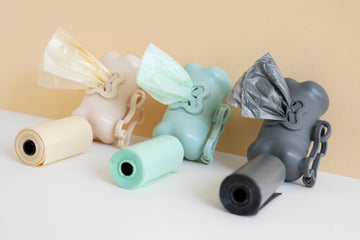
'/%3E%3Ccircle cx='60' cy='45' r='18' fill='%23f4c2a1'/%3E%3Cpath d='M42 75 Q60 90 78 75 Q78 95 60 100 Q42 95 42 75' fill='%23f4c2a1'/%3E%3Cpath d='M45 40 Q60 25 75 40 Q75 35 60 30 Q45 35 45 40' fill='%23d4a574'/%3E%3Ccircle cx='52' cy='50' r='2' fill='%23333'/%3E%3Ccircle cx='68' cy='50' r='2' fill='%23333'/%3E%3Cpath d='M55 58 Q60 62 65 58' stroke='%23333' stroke-width='1.5' fill='none'/%3E%3C/svg%3E)
